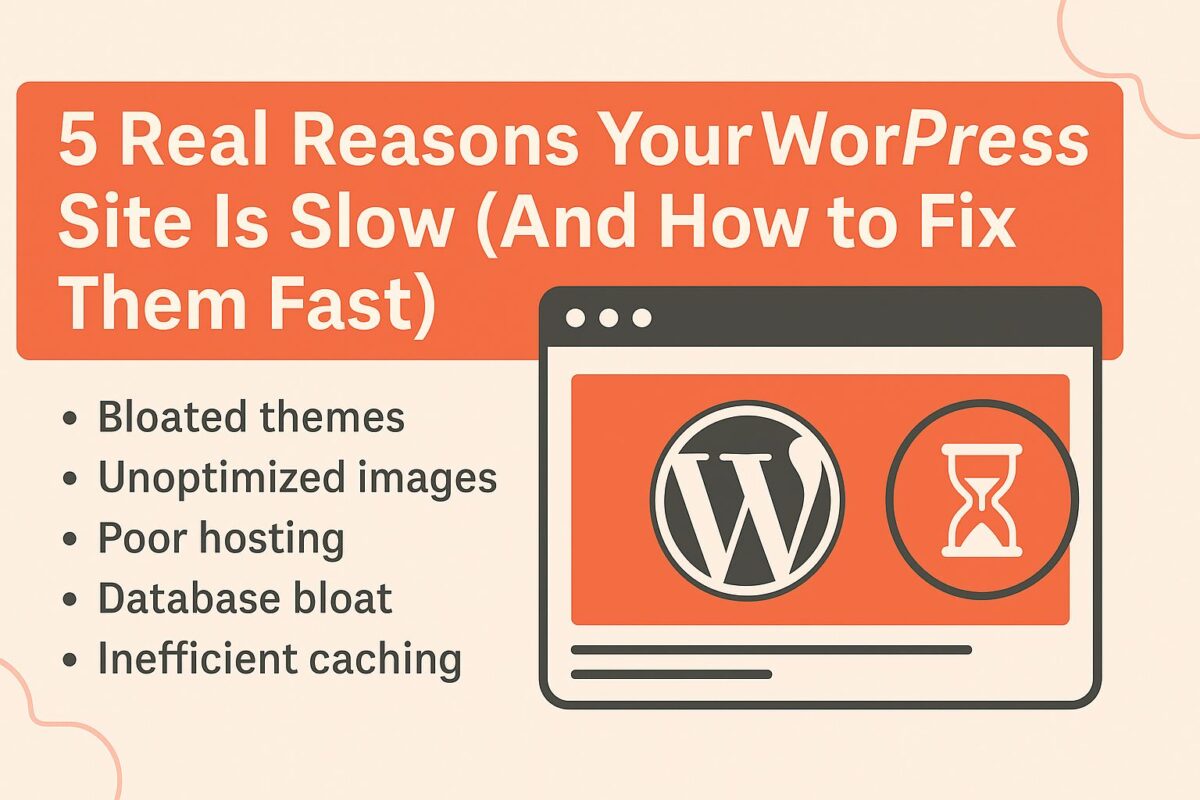5 Real Reasons Your WordPress Site Is Slow (And How to Fix Them Fast)

If your WordPress site feels sluggish, you’re not alone — and you’re not imagining it. Page speed is a critical factor for both users and search engines. A slow-loading website leads to frustrated visitors, higher bounce rates, and lower rankings. But here’s the good news: most WordPress speed problems are avoidable and fixable. In this article, we’ll walk through five real, root causes of poor performance — and how to eliminate them quickly and effectively.
1. Bloated Themes and Plugins
One of the most common culprits behind a slow WordPress site is an overloaded theme or too many active plugins. Some themes include dozens of features you’ll never use, loading extra CSS, JavaScript, and font files on every page. Similarly, poorly coded or unnecessary plugins can run background processes, database queries, or scripts that add weight to your site.
How to Fix It
- Switch to a lightweight, performance-optimized theme like Astra or GeneratePress.
- Audit your plugins. Deactivate and delete any you’re not using.
- Use the Query Monitor plugin to identify which plugins slow your site down.
2. Unoptimized Images
Large image files are a silent killer of site speed. If you upload photos directly from a phone or camera without compressing or resizing, each image can be several megabytes — causing pages to load slowly, especially on mobile networks.
How to Fix It
- Compress images before uploading using tools like TinyPNG or ImageOptim.
- Use modern formats like WebP for better compression without quality loss.
- Implement lazy loading so offscreen images don’t load until needed. (WordPress 5.5+ includes this by default.)
3. Poor Hosting and Slow TTFB
Your hosting provider plays a major role in how fast your website loads. Shared hosting with overcrowded servers often leads to high TTFB (Time to First Byte), where even simple pages take seconds to start rendering.
How to Fix It
- Run a TTFB test to check your server response time.
- Upgrade to a high-performance host with LiteSpeed, NGINX, or dedicated WordPress optimization (e.g., Cloudways, SiteGround, or Rocket.net).
- Use a CDN (Content Delivery Network) like Cloudflare to deliver assets faster worldwide.
4. Database Bloat
Your WordPress database stores everything: settings, post revisions, spam comments, plugin data, and more. Over time, this data builds up — especially in the wp_options table — slowing down queries and admin performance.
How to Fix It
- Clean up expired transients and post revisions with a plugin like WP-Sweep or Advanced Database Cleaner.
- Manually review large autoloaded entries with this SQL query in phpMyAdmin:
SELECT option_name, LENGTH(option_value) AS size FROM wp_options WHERE autoload = 'yes' ORDER BY size DESC LIMIT 20; - Delete or disable unused plugin options — but always back up first!
5. Inefficient Caching and Too Many Requests
Without proper caching, every visit to your site triggers PHP and database processing. This wastes time and server resources. On top of that, loading 100+ CSS, JS, or font requests per page overwhelms browsers and delays rendering.
How to Fix It
- Enable full-page caching with LiteSpeed Cache, WP Rocket, or Powered Cache.
- Minify and combine CSS and JavaScript files where safe to do so.
- Preload fonts and defer non-critical scripts using tools like Asset CleanUp.
Quick Checklist: Is Your Site Affected?
If you answer “yes” to two or more of these, your WordPress site needs speed work:
- Does your site take longer than 3 seconds to load on mobile?
- Are you using a theme with features you don’t need?
- Do you have 15+ plugins active?
- Is your image library full of 1MB+ files?
- Is your TTFB above 500ms?
- Have you never cleaned your database?
Bonus Tip: Don’t Rely Only on Google PageSpeed
While PageSpeed Insights is helpful, real performance must be tested using:
- Chrome DevTools → Network tab: to see actual load times and file weights
- GTmetrix: for visual waterfall breakdowns
- WebPageTest: for TTFB, LCP, and CLS from different locations
Final Thoughts
Speed is more than a nice-to-have — it’s a ranking factor, a conversion booster, and a customer experience essential. If your WordPress site is slow, don’t just install another plugin. Audit your stack, clean your database, optimize assets, and upgrade where it counts.
Need help speeding up your site? Request a free audit from SpeedWP Pro and let our experts identify exactly what’s holding you back — and how to fix it fast.
